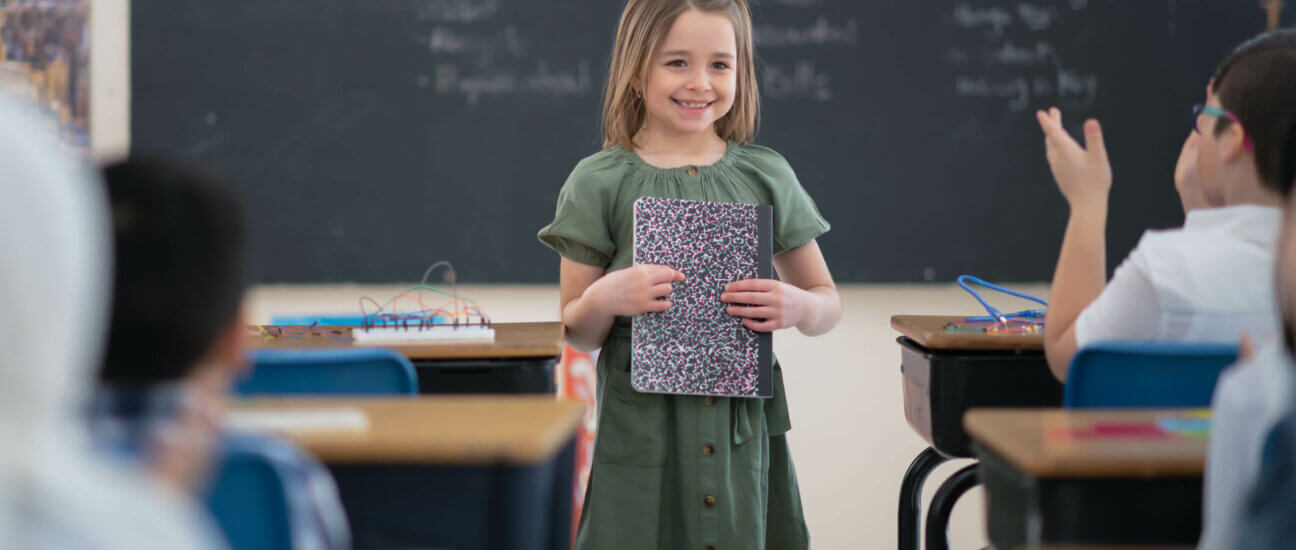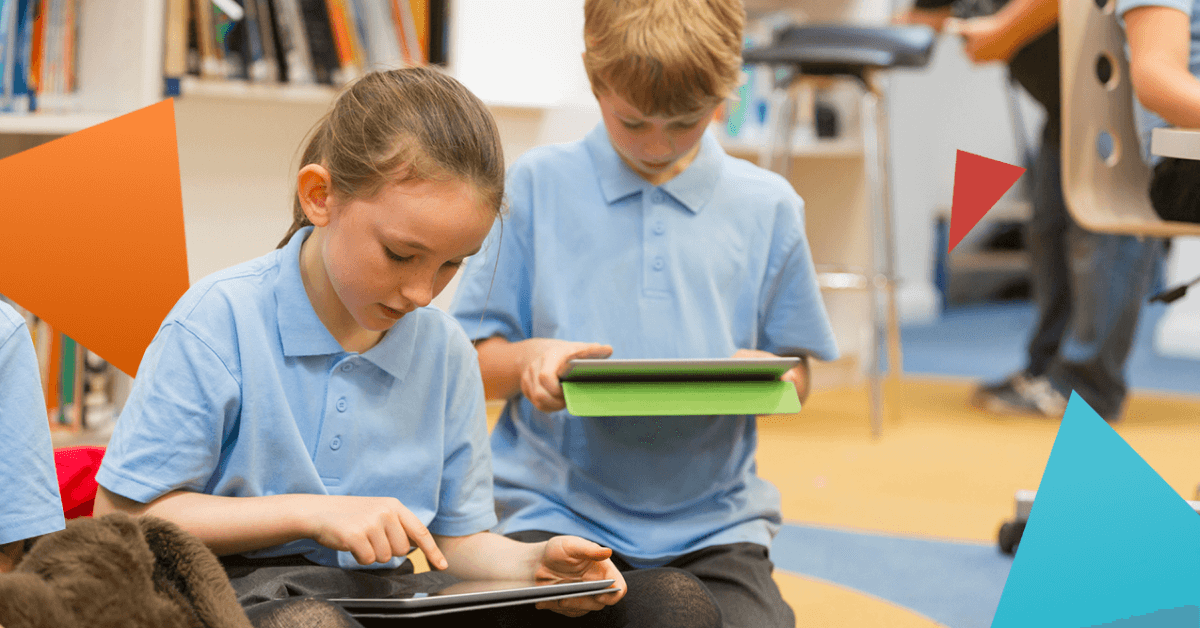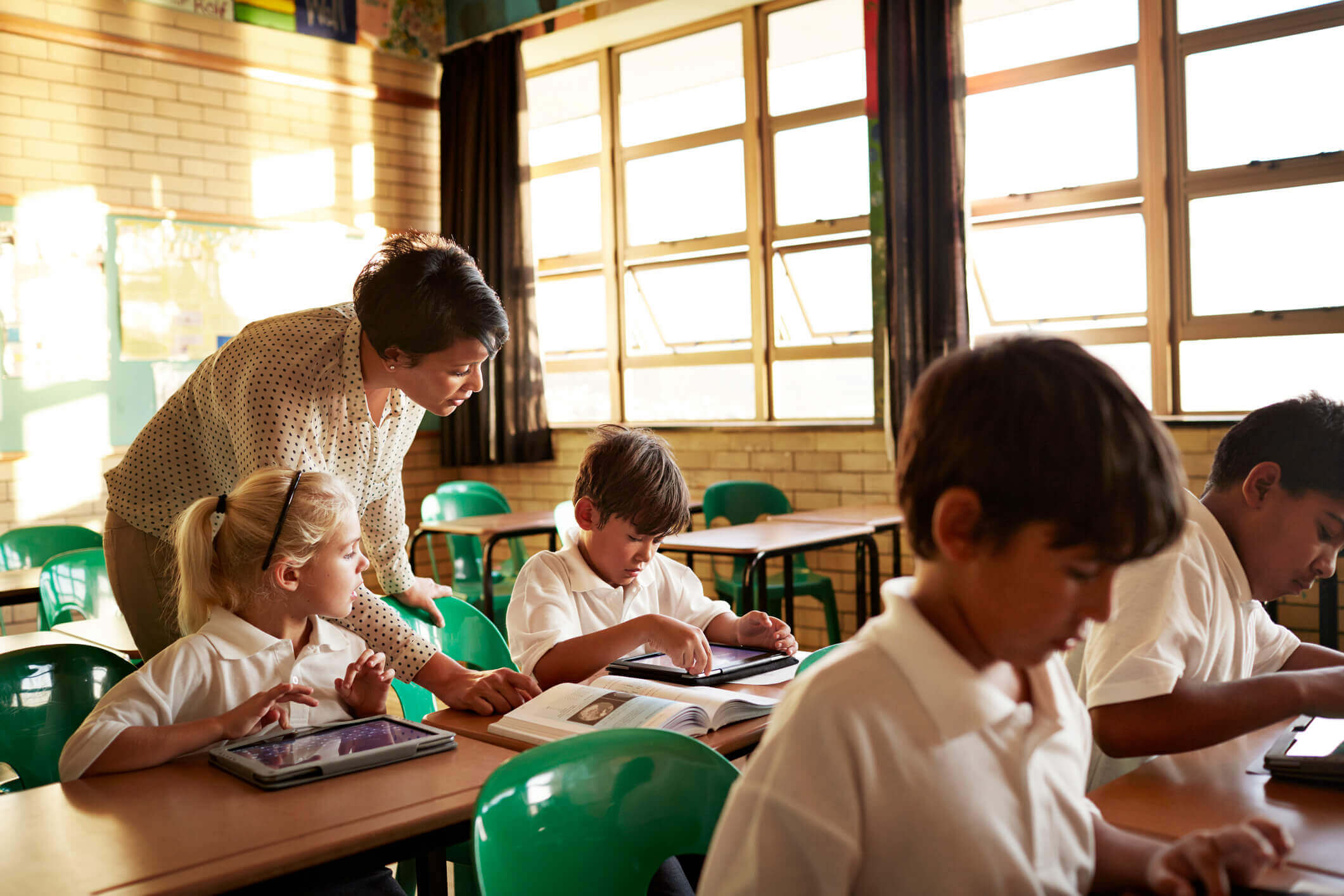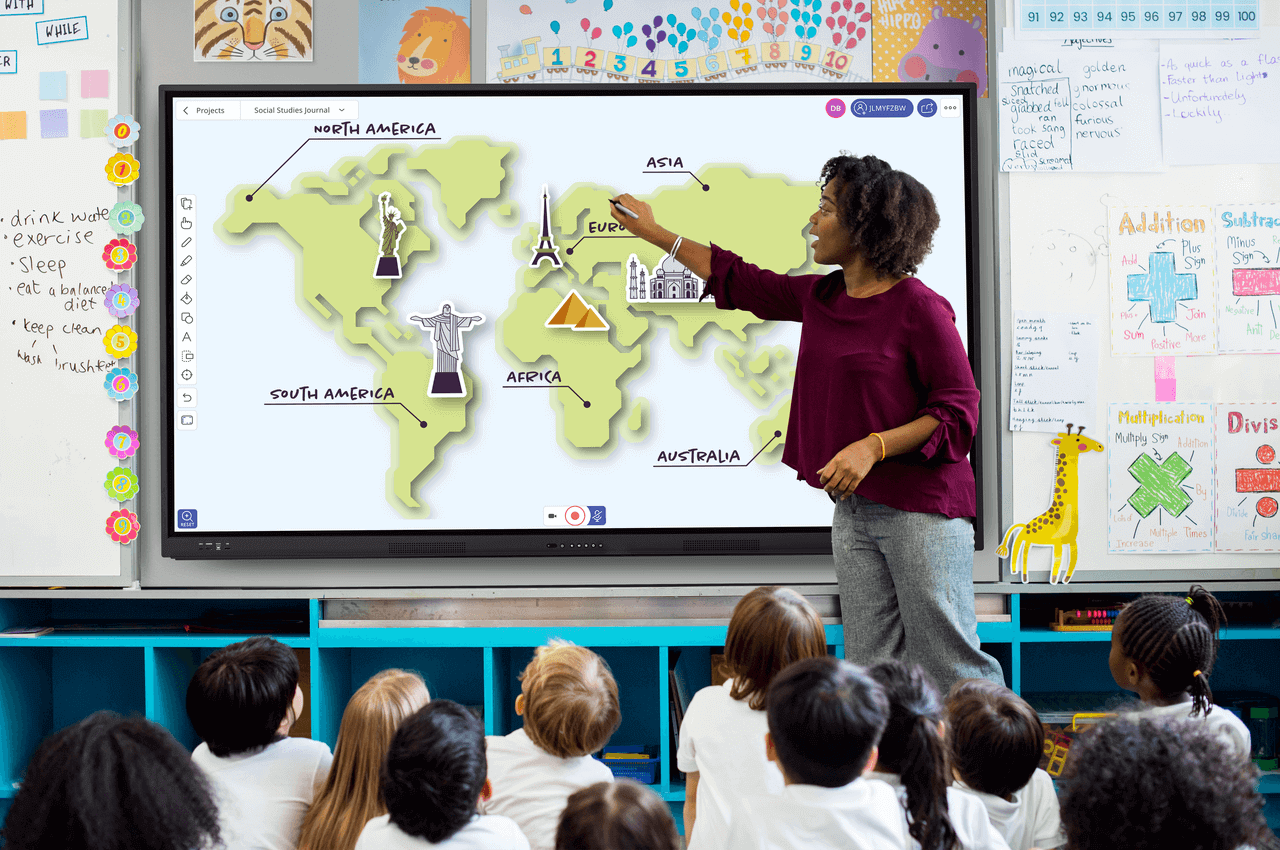Published on September 27th, 2023
How To Encourage Public Speaking in Children
15 minute read

Public speaking is an important skill for children to learn. It allows them to express themselves clearly and can help improve their academic performance and personal growth.
Whether it’s giving a speech, debating, or presenting, confident public speaking begins with strong support.
Here, we explore how to encourage public speaking in children, including how you can help them gain confidence and become articulate communicators, and how children can benefit from using technology in their presentations
Why encourage children to speak in public?
It’s important to encourage children to speak in public as it has several benefits for their overall development. It assists children in developing good communication skills, which is an important life skill to have. Children learn to communicate their thoughts and present ideas.
They can broaden their vocabulary and capacity to communicate confidently by practising public speaking from a young age. Public speaking improves presentation skills, teaching children how to arrange their ideas, organise their thoughts, and develop captivating presentations.
These skills are useful in formal situations, such as school presentations or even future employment. They are also important in everyday life. The ability to properly communicate information can make a great impression.
Encouraging young children to do public speaking also helps them gain a good grasp of body language. They learn to verbalise their message and engage listeners by using gestures, facial expressions, and posture.
These skills can also aid children with their listening skills, speech writing, and observation skills. These are essential skills that they will need later in life.
Encouraging children to speak out loud is also beneficial to teachers. Getting kids to the front of the class to present to their peers is a great way to monitor student engagement, and can tell you if they truly understand the subject.
Top tips for developing public speaking skills in children
Pre-primary school
Developing public speaking for young kids (ages 0-5) requires a gentle and age-appropriate approach. Here are some pointers to help develop public speaking for kids at this early stage:
- Storytelling: Encourage a child to share their own stories or fairy tales. This allows them to improve their pronunciation and helps them become confident communicators. Give them a topic if they’re anxious, and let them go from there.
- Show and tell: Organise “show and tell” sessions in which a child can bring an object from home and discuss it in front of their classmates. Public speaking activities like these allow a child to practise speaking in front of a small group and build their oratory skills.
- Puppets or props: Include fun puppets or props in your stories or presentations. These visual tools help children in feeling more at ease and interested when speaking. They can shift part of their focus away from their anxiety.
- Singing and rhyming: Encourage children to sing fun songs and recite rhymes. This not only improves their language abilities but also encourages a child to communicate rhythmically and expressively.
Engaging shy and quiet students can be a challenge for teachers, particularly when it comes to encouraging public speaking. This is why making games out of these skills, or tying it into students’ interests, is such a great idea.
Primary school
Children aged 4-7 need an easy, but constructive, approach to developing public speaking abilities. Here are some tips and public speaking activities to help students strengthen this life skill:
- Presentations: Include frequent classroom presentations in which each child has the opportunity to speak in front of their peers. Assign fun themes and provide clear rules to assist children in organising their presentations.
- Debates: Organise debates or group discussions on age-appropriate topics. An example of this is “Are books better than movies?”. This allows students to express themselves, think critically, and practise persuasive speaking skills. Have some fun public speaking competitions, as this might make them more motivated.
- Body language: Teach children the value of keeping eye contact, using proper hand gestures, and standing firm.
- Video presentations: This is a way for children to practise speaking in front of a camera. It allows students to get more comfortable with public speaking in a variety of settings.
- Gamification: Incorporate engaging games that enhance public speaking abilities. These can be role-playing or storytelling. An example is the “Alternative Ending” game. A teacher picks a movie/show that the kids are familiar with. Then small groups contribute their own alternative ending. It’s a hilarious game at a kids’ level that can really fine-tune a child’s confidence.
Secondary school
Between the ages 11-16, children require a more constructive approach to improving their public speaking skills. Here are some activities to assist pupils to improve their public speaking abilities:
- Debate club: Encourage pupils to join debating groups or public speaking organisations. These clubs offer a lot of opportunities to practise and create organised discussions and public speaking competitions.
- Mentorship and workshops: Hold seminars or invite guest speakers to instruct students on public speaking techniques. These lessons can include speech structure, delivery tips, and how to cope when they feel nervous.
- Mock interviews: Hold mock interview sessions to help students communicate professionally. This is especially helpful for older students. Provide constructive comments on their speaking style, and ability to answer questions well.
- Leadership: Encourage students to take on leadership positions. These can be in student government, clubs, or organisations. Examples of activities are school announcements, leading meetings, and representing their peers.
Top public speaking tips for kids
Public speaking can be scary, regardless of your age, but there are things you can do to help your child ensure success, including…
1. Practise
Encourage your child to practise their speech, even if it’s just for a few minutes. The old saying ‘practice makes perfect’ is definitely true when it comes to public speaking, and your child will feel much more confident when they know what they’re going to say. Your child should practise on their own and in front of friends and family to simulate what it will be like speaking to an audience.
2. Body language
Remind your child that it’s not just what they say that their audience will pay attention to. When your child is practising their speech, you should tell them to stand tall, making eye contact with their listeners. Your child should talk with their hands too – to emphasise important points and add some energy to their speech.
3. Speak clearly and slowly
One of the main identifiers that someone is nervous about public speaking is how fast they talk. The problem with this is that your child’s audience may not understand what they are saying. To avoid this, you should encourage your child to take a deep breath, pause and slow down. This helps the audience digest information and means topics and ideas can resonate more.
4. Connect with the audience
Finally, it’s important that your child remembers to connect with their audience. Audiences will retain information more easily if they feel like they are being spoken to directly. Additionally, you should tell your child to keep an eye on their audience’s body language too. If people start to look a little bored, your child should get more animated and energetic, to reengage their audience.
How can parents develop public speaking skills in kids?
Parents have a major impact on the growth of their children’s public speaking abilities. It’s important to create a supportive environment where children can express themselves.
To help their child develop, parents must encourage and engage in open conversation and active listening activities, like debates, and allow children to share their views and ideas.
Engage children in regular conversations to help them improve their communication abilities. Ask broad, open-ended questions, listen carefully, and encourage them to share their thoughts. This helps children gain confidence in their ability to express themselves verbally.
Be a positive role model by showing your own great communication skills. When your child speaks, keep eye contact, actively listen and respond properly. Demonstrate to them the value and importance of good communication. It also helps to look for community events where your child can participate in public speaking classes, camps, or clubs.
How can schools improve children’s public speaking skills?
For schools to enable children to improve their public speaking abilities, teachers should include public speaking activities and tasks in the curriculum. Students can practise speaking and improve their communication skills across disciplines.
Offer public speaking workshops where students can learn and practise important speaking strategies. Speech organisation, delivery skills, and the use of visual aids can all be covered in these sessions.
A teacher should give students positive criticism after public speaking activities. Offer specific ideas for growth, emphasise their skills, and mentor them. Encourage both self-evaluation and peer feedback.
Using technology to help children with public speaking
Technology is a useful tool to motivate and appeal to children to improve their public speaking abilities. Interactive displays provide an interesting platform for kids to improve their skills.
Children can use interactive displays to include multimedia components in their presentations. These include photographs, movies, and interactive features, which help to make their speeches more engaging and compelling.
Promethean’s interactive whiteboard, the ActivPanel 9, enables interactive practice sessions. This allows children to record and examine their performances on the whiteboard and identify areas for development.
Technology improves audience connection by allowing real-time feedback, polls, and questions. This encourages active student engagement. Use gamification components to turn public speaking exercises into fun challenges or games. Technology’s visual aids and annotation functions improve learning and retention of knowledge.
Educators can create an immersive and engaging learning environment for students. It will develop their abilities with confidence and excitement.
Conclusion
Children need public speaking abilities as they grow and navigate the world around them. The ability to communicate ideas is important for personal growth, and future career prospects.
Encourage children’s public speaking abilities through practice, supportive surroundings, and technology. It gives them a strong toolkit that develops self-expression and critical thinking. Children with these skills can articulate their feelings and advocate for themselves and others.
For more advice and tips on working with children, including how to measure student engagement at university, and guidance on teaching children with a visual learning style, explore the student engagement section of the Promethean blog.
FAQs
Does it matter if my child doesn’t want to do public speaking?
There is no need for your child to speak in public if they don’t want to. It is better to allow your child to gain confidence through practice in low-pressure situations. Tell them that being shy isn’t necessarily a bad thing and that not everyone needs to be outspoken and loud.
At what age should children start developing public speaking skills?
Children as young as 5 or 6 years old can start developing basic public speaking abilities. The difficulty of the training might differ based on their readiness. Even younger children can improve these abilities by playing certain fun games.




